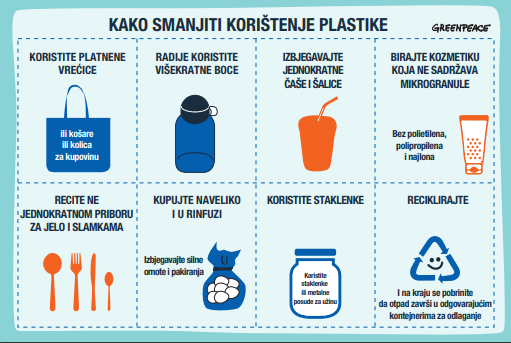Croatia to Ban Disposable Plastic Products in 2020?
Plastic cutlery, plates, straws, beverage mixing sticks, balloon holders, food containers, and styrofoam cups are just some of the products that Croatia will ban in 2020.
With the new Sustainable Waste Management Act by the Ministry of Environmental Protection, which should be adopted in the second quarter of 2020, it will be impossible to place some disposable plastic products on the market, 24 Sata reports.
The list includes cotton swabs, cutlery, plates, straws, beverage stirrers, balloon holders, food containers, styrofoam cups, and oxo-degradable plastic products that later decompose into invisible microplastics. The product list may also be expanded, depending on the results of the consumption reduction measures for items like plastic bags.
Specifically, on January 1, 2019, the implementation of measures to reduce the consumption of lightweight and very lightweight plastic bags began, and manufacturers and sellers are required to submit information to the Environmental and Energy Efficiency Fund about the quantity of bags placed on the market. In May 2020, we will also have results from the implementation of these measures, which also includes the mandatory payment for plastic bags and educating citizens. The EU's deadline for banning these products is July 3, 2021.
Vecernji List wrote back in 2017 that the estimated annual consumption of carrying bags in the Republic of Croatia is around 8000 tons. According to the European Commission recommendation that the EU Member States use bags that weigh an average 8.5 grams, it follows that the annual consumption of bags in Croatia is about 954,000,000 bags, or 212 bags per capita per year.
According to the Croatian Chamber of Commerce, which opposes such a ban, 8200 workers in 700 companies worked in the plastics and rubber industry last year. Production increased by 50% from 1990 to last year. Two years ago, we exported plastic worth $437 million. Furthermore, the Croatian Chamber of Economy published data that the analysis of the European association PlasticsEurope showed that if the plastic packaging for food was eliminated, the weight of the packaging would quadruple, the energy consumption would increase by 50 percent, there would be 60 percent more waste and twice the greenhouse gas emissions.
To read more about lifestyle in Croatia, follow TCN’s dedicated page.
Motovun Film Festival Joins Movement Against Single-use Plastics
The Motovun Film Festival, which runs from July 23 to July 27, is joining the global action ‘Plastic Free July’, aiming to raise awareness of the harms of single-use plastics, their permanent environmental pollution, and the consequences for living organisms, reports HRTurizam on July 11, 2019.
A simple calculation of last year’s Motovun festival brought some interesting results. The plastic cups that were used each day could build a tower higher than the Motovun hill, which stands at an unbelievable 277 meters above sea level!
Thus, with this year's slogan “Don’t throw our cups away“, the Motovun Film Festival will encourage caterers to pick up cups, straws and plastic utensils during the event. Those engaging in action will be labeled 'PLASTIC FREE', and visitors will be invited to support the caterers in action. Single-use plastic cups will be replaced by reusable ones, which visitors will be able to return for money back or keep as a souvenir.

Greenpeace Croatia is a partner of the festival, whose representatives will host a series of workshops and lectures about the ’shackles of plastic’.
Their representatives will attend a lecture on Thursday, July 25 at 18:30 to speak about the harmful effects of plastic and, in particular, the microbiology on the environment and life in general, the scale of pollution with all future implications, and solutions for the prevention of further pollution, as well as the ways each individual can actively participate in the promotion of rational and environmentally conscious use of plastics. At that time, activist Marko Capek will use his example of how he completely removed plastics from his life, and will also hold a workshop for making harmless deodorants and sunblocks.
Also on Saturday, July 27, at 18:30, Goran Zgrablić, a chef, sommelier and laser physicist, will hold a mini-course for cooking without waste, after which all the participants will prepare a meal together.
Within two years, a ban on single-use plastics will be incorporated into the laws of the EU countries and the actions that are currently being undertaken as pioneering efforts will become mandatory.
To read more about lifestyle in Croatia, follow TCN’s dedicated page.

